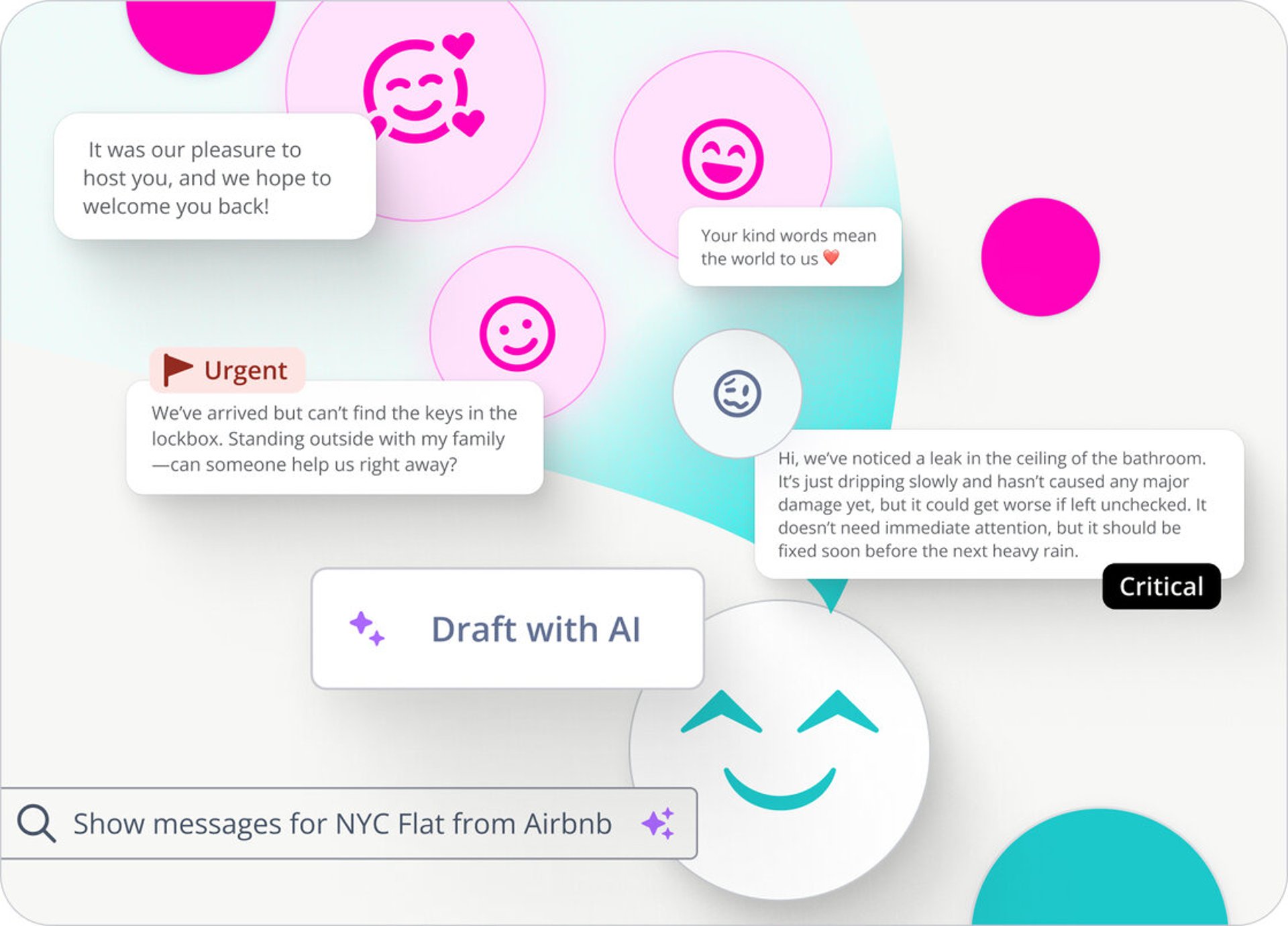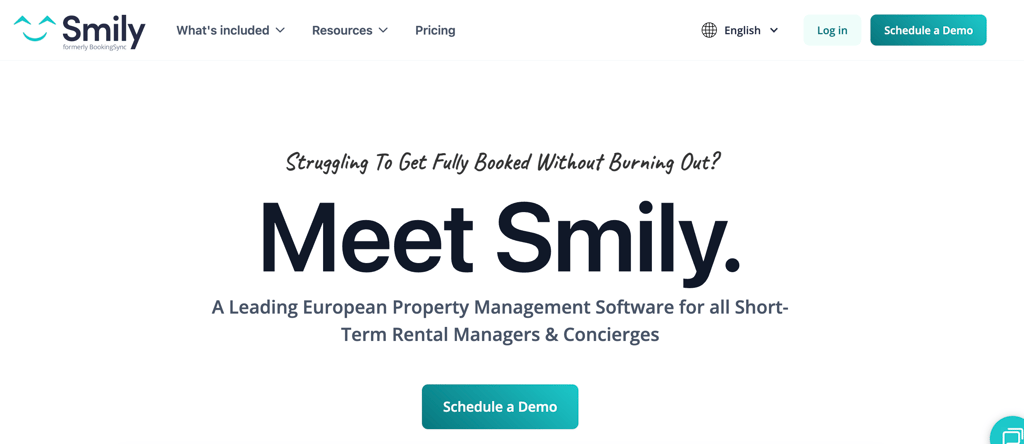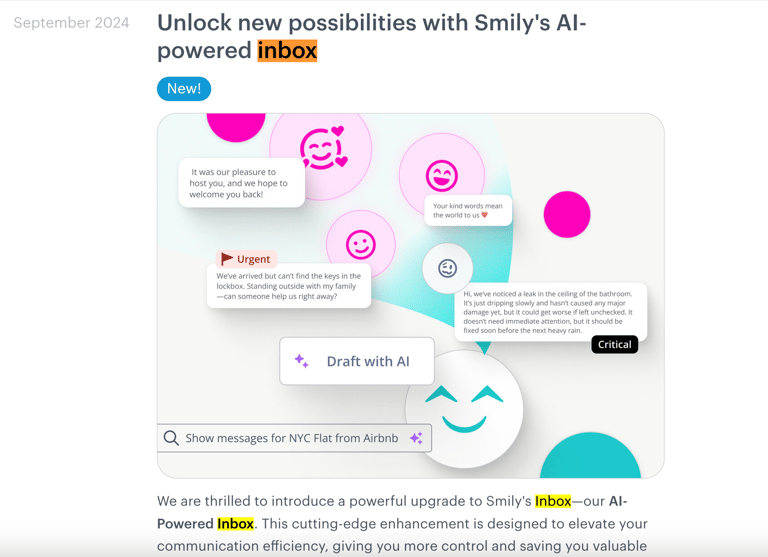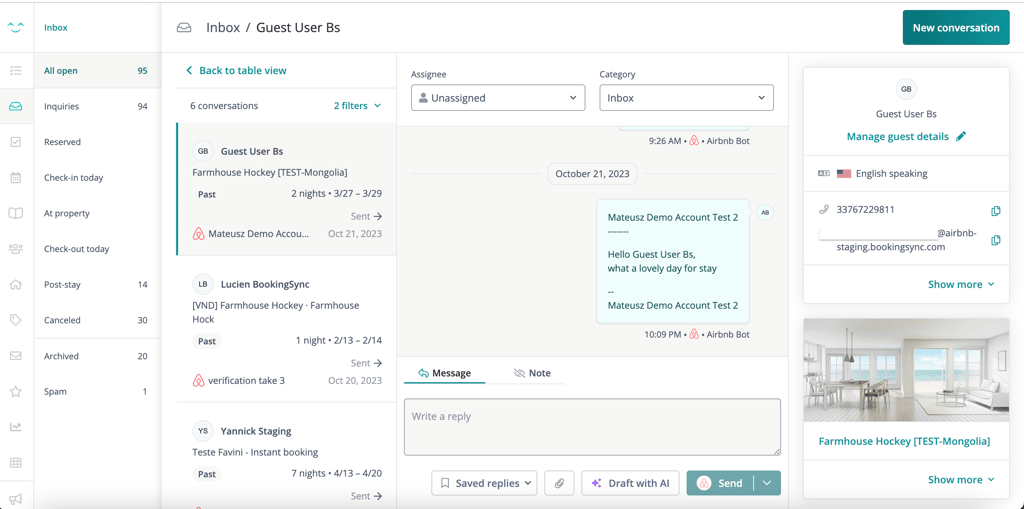
AI in Inbox
Intelligent Messaging for Property Managers
Context
Smily is an all-in-one vacation rental software platform, used by thousands of property managers to run their operations. The product combines reservation management, channel distribution, guest communication, payments, and more into a single system.
Our users, property managers and agencies rely on Smily to save time and deliver seamless guest experiences. Many of them manage dozens or even hundreds of properties, meaning their daily workload involves juggling high volumes of bookings, guest interactions, and operational tasks. For these users, efficiency isn’t a nice-to-have: it’s critical.


Problem Space
Property managers live inside their inboxes: answering guest questions, handling complaints, and upselling services. Yet the inbox had become a source of inefficiency; messages were unstructured, often urgent, and required fast responses. Without prioritisation or automation, managers risked missing revenue opportunities, and guest satisfaction dropped.
From a product perspective, this was a chance to transform the inbox from a reactive support tool into a strategic growth and efficiency driver, powered by AI.
Discovery
Adoption: Over 50% of active accounts used AI Draft within the first month, showing strong pull from day one.
Efficiency: Property managers reported saving up to 2 hours per day, thanks to faster drafting and smarter message prioritisation.
Customer Feedback: While direct praise was common, the strongest validation came when clients who had been paying for third-party inbox tools chose to return to Smily, because the AI-powered unified inbox now fully covered their needs.
Strategic Positioning: This feature became a key differentiator for Smily, perfectly aligned with our commitment to making property managers’ lives stress-free. By embedding AI directly into daily workflows, we empowered managers to save time, reduce pressure, and still maintain their brand voice. Rather than positioning AI as a shiny add-on, we used it as a practical enabler — a way to let property managers focus on what matters most while the system handled the heavy lifting.
To deeply understand how property managers interact with the inbox, I conducted structured interviews and workflow mapping across agencies of different sizes. Using the Jobs-to-Be-Done framework, I identified the core “jobs” for which managers hired the inbox:
Reply quickly to reassure guests and resolve issues in real time.
Maintain consistency in tone and branding — ensuring replies were professional, empathetic, and aligned with the property’s image.
Stay in control of urgent and revenue-critical messages, such as complaints or upsell opportunities.
From these conversations, I built an Opportunity Solution Tree (OST) to map the landscape:
Opportunities (pain points) identified:
Efficiency: too much time spent drafting repetitive replies.
Prioritization: inability to separate urgent issues from routine queries.
Revenue growth: missed upsell opportunities (early check-in, late check-out).
Context switching: long, complex threads without quick summaries.
Multilingual communication: friction handling guest messages in different languages.
Using a pain vs. frequency matrix, I prioritized efficiency and prioritization as the most pressing opportunities to address first.
Next, I explored solution directions mapped against these opportunities:
Drafting replies with AI to cut time spent on repetitive messaging.
Classifying messages by urgency/sentiment to improve triage.
Suggesting upsells at the right moment.
Generating conversation summaries to speed up handovers.
Providing instant translations to simplify global communication.
I then applied an impact vs. effort framework to prioritize solutions. This surfaced two clear starting bets for the MVP: AI-powered draft replies (high impact, relatively low effort) and AI-based prioritization (critical for user trust and efficiency).
Competitive analysis
As part of discovery, I studied how competitors positioned and delivered their inbox products, combining desk research, hands-on testing, and customer feedback:
Websites & Positioning: Platforms like Duve, Guesty, and Hostaway framed the inbox primarily around time savings and operational efficiency. Messaging was consistent: faster replies, less manual work.
Hands-On Testing: By signing up for trials and using the products directly, I saw how these tools relied heavily on templates and shortcuts. This helped property managers respond quickly while maintaining a professional, branded tone.
Content Review: Webinars and demos reinforced this value proposition: an inbox that centralises guest communication and reduces workload, with emphasis on speed and consistency.
Customer Feedback: When I spoke with Smily clients already using third-party solutions, they echoed the same themes: what they valued most was time saved, the ability to keep a consistent brand voice, and tools that ensured professionalism at scale.
Insights:
This research made it clear that if we wanted our inbox to deliver real value, we needed to address these core user expectations first: time efficiency, branding consistency, and professional tone. The first opportunity with AI was to take these existing needs and deliver them smarter: faster than templates, more adaptive in tone, and intelligent enough to highlight what truly mattered.
Hypothesis and Iteration
We initially hypothesized that full automation would solve the biggest pain: time wasted on repetitive replies. The concept was that AI could detect the message type, generate the right response, and send it automatically — removing human effort altogether.
To validate this, we built a low-fidelity prototype and tested it with property managers we had interviewed during discovery. The feedback was consistent:
They wanted full ownership of guest communication, especially in sensitive situations.
They feared that auto-sent messages could miss important nuances.
They were open to AI assistance — but only if they could review, edit, and personalize before sending.
Based on this insight, we iterated quickly. Instead of “automated messages,” we reframed the feature as “Draft with AI” , an assistant that generates a high-quality draft, while keeping the manager in control. We tested this adjusted concept again, and the response was overwhelmingly positive: users appreciated the time saved, but more importantly, they felt empowered rather than replaced.
With this validation in place, we had the confidence to move from prototype to real design and development, focusing our first MVP on AI draft replies and prioritization tags as the most impactful, user-validated features.


Solution Design
The final solution focused on two core capabilities:
AI Draft Replies: The core feature was a “Draft with AI” button that generated a ready-to-edit draft reply. Unlike simple text generation, the system pulled context from the entire guest conversation, as well as the property details, booking information, and guest profile. This ensured that replies were not only fast but also highly relevant, personalised, and aligned with the brand’s tone. Property managers could then review, adjust, and send — striking the right balance between efficiency and control.
AI Prioritisation: Incoming messages were tagged by urgency and sentiment, helping managers focus on what mattered most.
By narrowing the scope, we created a solution that solved the pain (time and prioritisation) while respecting users’ need for ownership.
Turning Vision Into Reality
As Product Manager, I drove execution well beyond writing the PRD.
PRD in Notion: I authored a detailed PRD in Notion, outlining the problem space, user stories, acceptance criteria, and success metrics. The PRD acted as the single source of truth for stakeholders, ensuring alignment across product, design, and engineering from the start.
Prototype with AI (Claude): To go beyond words, I built a low-fidelity prototype using Claude. This showed how the system could generate replies leveraging conversation history, booking details, and property information. By pairing the PRD with a working prototype, I made the feature vision much more concrete for designers and developers, turning abstract requirements into something they could immediately visualise.
Collaboration with Engineering: I worked hand-in-hand with engineers on implementation, particularly around prompt engineering for GPT integration. Together, we refined prompts to ensure drafts were accurate, personalised, and consistent with brand tone.
Evals for AI Quality: In AI features, quality cannot be left to chance. I designed evals — structured tests to measure how well generated replies met criteria like tone, relevance, language detection, and personalisation. These evals gave us objective benchmarks, surfaced weaknesses early, and provided a repeatable way to track improvements.
Testing & Iteration: After internal testing, we spotted issues in language detection, where replies sometimes defaulted to the wrong language. We adjusted the prompts, reran the evals, and iterated until the system reliably produced the correct output. Manual checks across multiple languages and scenarios gave us confidence before release.
This structured execution, from PRD in Notion, to prototype, to eval-driven iteration, ensured that we moved from concept to production with clarity, rigour, and confidence in AI quality.
Results & Impacts


Reflections and Learnings
This initiative helped us showcase how discovery-driven product management within the company led to superior product and more value to the end-user:
Assumptions ≠ reality: Our initial vision of full automation was attractive in theory, but real users wanted control.
Human-in-the-loop builds trust: Positioning AI as an assistant, not a replacement, drove adoption.
Less is more: By focusing on drafting and prioritisation, we shipped faster, validated value, and kept scope manageable.
Differentiation matters: This feature helped Smily stand out by integrating AI meaningfully into the core product. It was fully in line with our mission: making the lives of property managers stress-free while helping them scale their business with confidence.
In the end, AI in Inbox wasn’t just a feature. It was a shift in how property managers engage with communication, turning their inbox into a tool that is faster, smarter, and still very human.


Connect
Links
© 2025. All rights reserved.